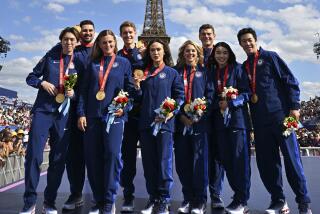U.S. is on a giant ski lift
- Share via
Reporting from Whistler, Canada — No need to clean your goggles or adjust your bindings -- that’s America on top of the Olympic Alpine leaderboard.
Austria? Well, word is the country is into baseball now.
The United States of A-miracle went two-three in Friday’s super-giant slalom at Whistler Mountain, climbing heights never before seen or contemplated.
Heading into the 1994 Lillehammer Games, America’s Alpine team was dubbed “Uncle Sam’s left-footed snowplow brigade.”
Four Olympics later, America is just putting its foot down.
The U.S. earned its fifth and sixth Alpine medals, with Bode Miller seizing super-G silver and rookie Andrew Weibrecht taking the bronze.
With six Alpine events remaining, the U.S. has already eclipsed the five Alpine medals won at the 1984 Sarajevo Games.
“You’ve seen a level of skiing out of the U.S. team that we haven’t put down in a long time . . . forever,” Miller said.
The irony here is that Miller, once the iconic outcast, is leading the huddle break.
Earmuffs off, first, to Norway’s Aksel Lund Svindal, who kept the United States off the top podium step with his winning time of 1 minute 30.34 seconds.
The reigning World Cup overall champion, and heir to the Norwegian throne, Svindal added gold to the silver he won in Monday’s downhill.
Svindal, skiing with the No. 19 bib, clipped by 0.28 the top time Miller posted from the No. 11 start. The Norwegian didn’t know where he stood when he flashed past the finish until he picked out the smiling face of countryman Kjetil André Aamodt -- who retired with a record eight Olympic medals.
“That was my confirmation it was a good run,” Svindal said.
Svindal may end up the individual Alpine star of these Olympics, but the country to beat has 50 stars on its flag.
Four years ago, the U.S. Ski team went to Turin with the motto “Best in the World” and left Sestriere with two medals to Austria’s 14.
So far in Vancouver, America leads Austria six Alpine medals to one (bronze).
Bill Marolt, chief executive of the United States Ski and Snowboard Assn., fought back tears as he answered questions on the ramp outside the media tent.
He spoke of the incredible momentum the Alpine team has developed and how his skiers were “feeding off each other.”
And he praised the unsuspecting veteran behind it: Bode Miller.
The ski team was so exasperated with Miller’s behavior after Turin that one coach could have kicked him, right there, from Sestriere Val d’Isere.
Miller eventually left the team on his own, only to return last fall with a different attitude.
“Credit to Bode,” Marolt said. “That he would take the time to figure things out and that he could still have an impact on his sport and his team.”
Miller, winless in Turin, has two medals in two Whistler events and increased to four his all-time American medal count.
Miller talked about how the fire had gone out of him last spring when he walked away from the World Cup and began a seven-month sabbatical.
“I was not inspired by any other skier I was skiing against,” Miller said. “I was not inspired in general.”
When Miller returned last fall, a month short of his 32nd birthday, he embraced the role of elder statesman and dreamed of standing on the Olympic podium next to a young racer he mentored.
It happened Friday, when Miller draped his arm around 24-year-old Olympic rookie Weibrecht, the pride of Lake Placid, N.Y., which hosted the 1980 Winter Games.
“I’d say 50% of the kids growing up there grew up wanted to be an Olympian,” he said.
Weibrecht was supposed to come here and get his skis wet -- and he’s walking away with a bronze.
“Having Bode around has been a huge asset,” he said. “He’s been through all of this.”
Miller fever . . . it’s contagious?
“Once that momentum starts,” Miller said, “everyone starts to want that more.”
Weibrecht set the tone for the day when he took the lead out of the No. 3 start spot.
His lead stood until Miller bumped him out, then fell to third when Svindal took the lead from Miller.
Weibrecht, nicknamed “The Warhorse,” then stood in the finish area and played out the Olympic game known as “The Agony of Waiting.”
He figured there was no way his time would hold, or even Miller’s for that matter -- not with the top super-G guns racing from positions 15 through 23.
“We knew there were a lot of big bullets to dodge,” Weibrecht said.
But only Svindal put down a time that could bump down the Americans.
Both of the hot-shot Canadians -- Manuel Osborne-Paradis and Robbie Dixon -- crashed on a rock-hard track filled with hairy moments and hairpin turns. The jump known as the “Weasel” put a lump in the throat of every skier who almost missed the next gate because of it.
Weibrecht and Miller might have feared Austrian Michael Walchhofer, the World Cup super-G leader.
Walchhofer, though, appeared to ski with his safety brake on and ended up 1.66 seconds off the pace, with a finishing result that matched his bib number: 21.
Weibrecht was taking nothing for granted. His bronze basically solidified, with only guys with high bibs from places like Bulgaria mopping up, Weibrecht kept peeking at the leader board as he conducted “post-race” interviews with a suddenly adoring media.
“I didn’t think I’d be where I am right now,” he said.
In Alpine terms, he spoke for his team -- and his country.
More to Read
Go beyond the scoreboard
Get the latest on L.A.'s teams in the daily Sports Report newsletter.
You may occasionally receive promotional content from the Los Angeles Times.







